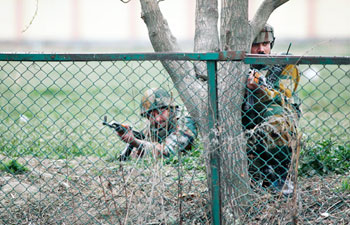
Srinagar, Mar 16: Jammu and Kashmir Police have detained Parandeep Singh, a daily wager with the public health department who allegedly provided shelter to militants who carried out the suicide attack on Wednesday, killing five CRPF men.
Police were looking for Parandeep Singh after his name figured in the interrogation of Bashir Ahmed alias Haroon Bhai — a resident of Uri in North Kashmir who worked for LeT.
Singh, who was on run after the attack on Wednesday, was detained early this morning, official sources said.
Besides Bashir, 22-year-old Zubair alias Abu Tallah alias Riaz, was held from Chattabal area in the outskirts of the city in connection with the attack. The arrest was made while he was talking to his handlers through the SIM card provided by Bashir, a local, the sources said
Zubair told the interrogators that he had dropped the two suicide attackers along with Bashir, who earlier carried out a recce of the force's camp at a school playground. It was Bashir's interrogation that led to the arrest of Zubair.
According to the investigators, a group of five Lashker terrorists had crossed over in Uri earlier this month out of which two had returned while others proceeded towards Srinagar.
Bashir, who stays in Srinagar, arranged the travel of the three to Tangmarg area of north Kashmir where all of them met on March 11 at Singh's house.
He later shifted them to Tankipora area in the city from where they were escorted to the CRPF camp in Bemina area on March 13 to carry out the suicide attack.
Bashir shifted the third militant to Chhatabal area where he was put up in an already created hideout.
The two terrorists, disguised as cricketers, had stormed a CRPF camp in the first major attack in the city in three years. They were killed by the security personnel.





Comments
Add new comment